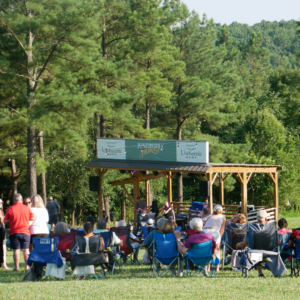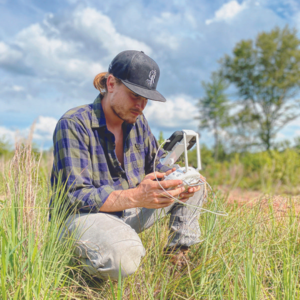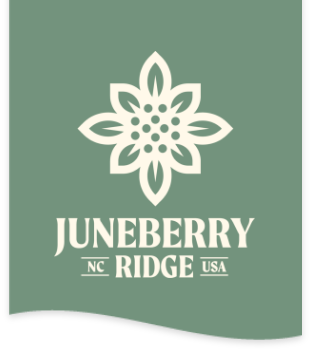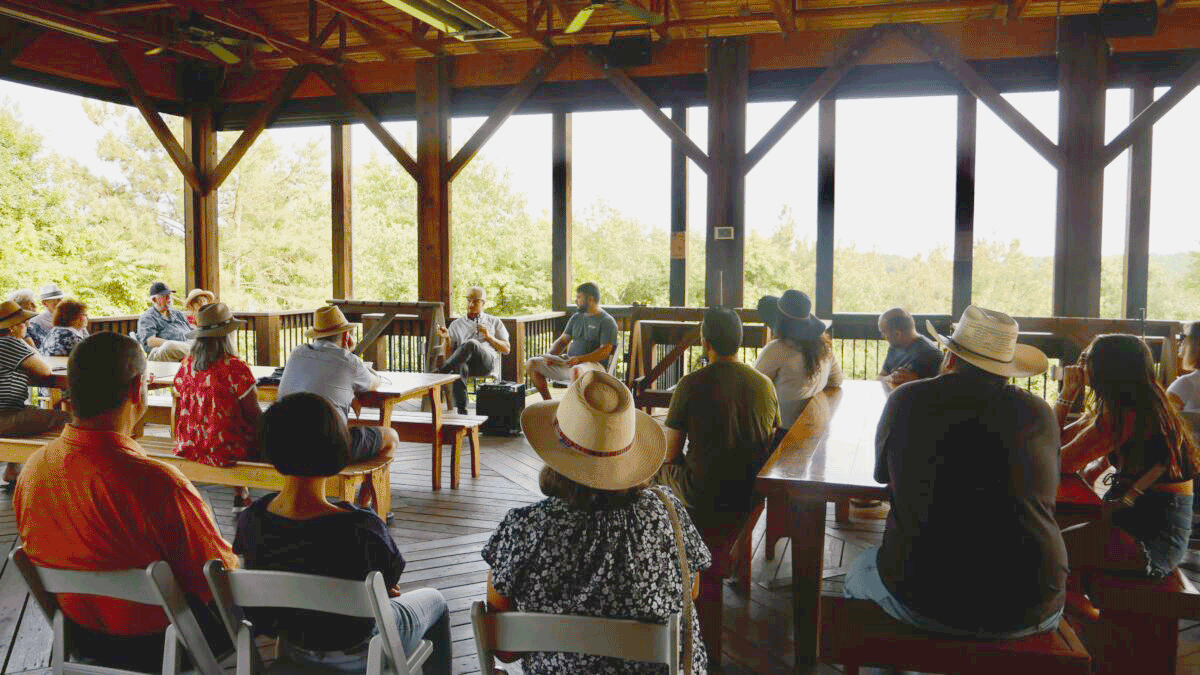What if a farmer, teacher, and author you trusted told you that soil health didn’t matter?
It caught us off guard. We’ve been working with Daniel Firth Griffith for years now, and we know he likes to make waves, but we wake up and go to sleep thinking about our soil health—Daniel helped us develop exactly that mindset here at Juneberry Ridge. So, like good students, we leaned in, and asked what in the world he really meant. Daniel had a point to make, “Sure, we can improve soil health, we can retain our watershed and sequester carbon. Regenerative agriculture can improve biodiversity, too. But does soil health really matter if we are destroying our neighbors and community in the process?”
It was 5:15pm on Saturday, June. 10, and it was sunny summer day, and we were grateful for the light breeze blowing through our Lucky Clays Five-Stand. Our bands were doing sound checks at the main stage. Ashton Thompson, our head of operations was here with Daniel to kick off the first day of our Juneberry Jams festival, our third year hosting an event like this, but the first time we invited guests to join us for a discussion about regenerative agriculture quite like this. We weren’t sure how this first event would turn out but looking around we had about 60 festival guests who arrived early, just for this. And they were all at the edge of their seats, ready to hear more.
Daniel shared that local farmers spend over 80 hours per week farming and over 30 hours marketing. To grow the regenerative agriculture movement, we need to focus on keeping it small and working closely with our local communities. As we work towards regenerating the soil, it’s essential we also work to revitalize the spirit soul of our communities.
We should repeat that. Regenerative agriculture is about activating, involving, and serving our community. Conventional thinking has us placing too much emphasis on scale, while conveniently ignoring the “whole” of which we’re intimately a part of.
This framing allowed us all to contemplate the interconnectedness of soil health, personal well-being, and the overall state of our society.
Daniel argued that we cannot achieve true regeneration without nurturing strong connections with our neighbors, local businesses, and fellow farmers. These relationships are vital for sharing knowledge, resources, and support, ultimately fortifying our collective efforts to enhance soil health and promote regenerative farming practices.
Griffith’s talk sparked a lively discussion among the audience, with many expressing their newfound appreciation for the role soil health plays in our lives. The conversation touched upon various aspects of regenerative agriculture and the importance of fostering a strong connection between consumers and the land that produces their food.
So, does soil health really matter?
The answer is a resounding yes. Soil health is undeniably crucial. However, it’s also true that we must find balance between nurturing the environment and fostering community connections.
This gives us a uniquely inspired challenge here at Juneberry Ridge. We are learning, training, and practicing methods new to us to regenerate our land. In many cases we’re making changes to our farmland that are radically divergent from how the land was managed over the last hundred years. It is challenging, but we’re always growing and remembering that what we do here only makes its true impact if we can involve our communities in the process, too.
In conclusion, soil health truly matters, but it’s just one piece of the puzzle. By combining our dedication to soil health with a focus on relationships and community well-being, we can create a holistic approach to regeneration that benefits both our environment and the people who depend on it.
An hour with Daniel flew by. More festival attendees were arriving, and The Trailblazers were hitting the stage with their bluegrass quartette before our main act, Forever Abbey Road. Our culinary team was filling the air with some delicious farm-fresh eats, Juneberry Jams 2023 was off to a great start!
We’re thrilled by the success of our first speaker series at Juneberry Jams and are eager to continue bringing thought-provoking discussions to the Juneberry Ridge community.
We invite you to explore the world of regenerative agriculture and consider how the health of our soil impacts not only the food on our plates but also the health of our whole planet. Together, we can change the way the world grows.
Juneberry Jams is a one-of-a-kind annual festival celebrating regenerative agriculture, great music, and farm-fresh food. In our third year, we were excited to introduce a new addition to the event – a speaker series offering guests a chance to learn about how our food systems are changing for the better through farming practices that seek not to sustain our planet, but to restore it. Regenerative agriculture is quickly becoming a buzzword across major industries however there’s no better place to learn about soil health, local food, and holistic farm management than our local farms forging a path for healthier agriculture. Juneberry Jams is made possible by title sponsor and community partner Uwharrie Bank and produced in partnership with Tosco Music.

Daniel is a storyteller and the founder and director of the Robinia Institute, the Mid-Atlantic Hub of the Savory Institute. After overcoming a life-threatening genetic disease, he turned to farming and found a life filled with abundance, joy, and health.
The Savory Institute is a global network of decentralized Hubs with a mission to facilitate the large-scale regeneration of the world’s grasslands and the livelihood of its inhabitants through holistic management. In central Virginia focused on rewilding Through his leadership, mentorship, and teachings at the Robinia Institute, Daniel is empowering others to think and act holistically for a better future.



